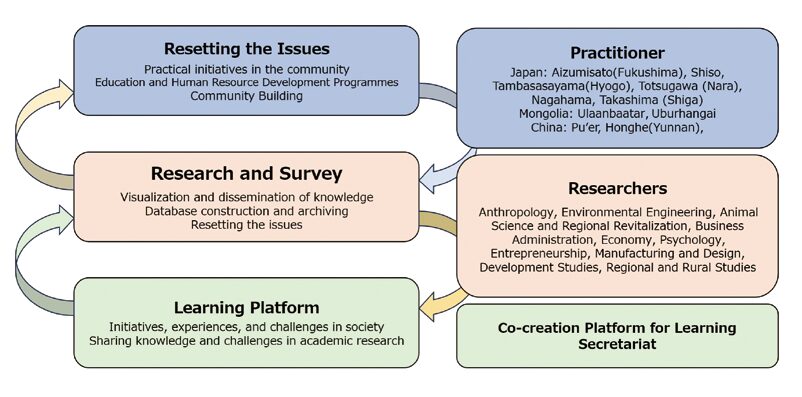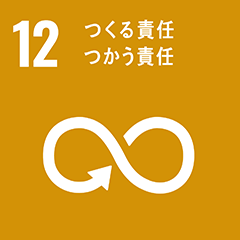Inochi Declaration
Express our gratitude to nature and those who bring food to our tables, and remember that each of us has a role in passing on what we value to future generations.
Today, we are living in a time of unprecedented urban concentration, where rural depopulation and the decline of local industries are becoming increasingly serious issues. This is not a phenomenon limited to Japan; in many developing regions such as Asia, Africa, and Latin America, the outflow of young people to cities, the aging of rural populations, and the disappearance of local industries are pressing social concerns. Ways of life, cultures, and craftsmanship rooted in agricultural, mountainous, and fishing villages are steadily vanishing, losing the opportunity to be passed on to future generations.
In response to this situation, the joint project under the The University of Osaka Social Solution Initiative, titled Building Sustainable Regional Models through Agriculture, Forestry, and Craftsmanship: Linking Local Knowledge and Technologies (Co-representatives: Professor Michinori Uwasu, Graduate School of Economics, The University of Osaka; Mr. Siquinfu, Representative Director, Kita no Kaze・Minami no Kumo), has engaged in efforts to promote the “localization of knowledge”. This concept is not about simply transferring knowledge or introducing technologies. Rather, it is about deeply learning from, respecting, and leveraging— across society—the indigenous knowledge embedded in regional ways of coexisting with nature, mutual human support, and time-honored practices in agriculture, forestry, fisheries, and crafts. These are invaluable forms of wisdom that cannot be measured by market efficiency alone.

Process of forming a “Learning and Co-Creation Community”
Through both research and field practice, the project has worked to visualize and share these values in collaboration with local communities. In education, for example, field studies have taken students to rural communities, where they engage in dialogues with residents and experience firsthand their lives and cultures—learning together about the value of the region. It is imperative to develop such initiatives across national, cultural, and urban-rural divides.
Within the concept of “localization of knowledge”, two core questions arise. The first is how we can pass down the wisdom, techniques, and spirit of “making”—which nurtures and sustains Inochi—to future generations. Handmade skills, the use of local materials, seasonal living, and cooperative labor are more than just means of production; they are “technologies of Inochi”—ways for people and nature to live in harmony. The second question concerns the restoration of ties between rural and urban areas. Cities and rural communities are not opposite: they are interdependent.
Urban life and economies are supported by rural practices. Water, energy, food, and raw materials for industrial goods are all gifts from nature brought forth by rural areas. For example, Japan’s reputation for delicious cuisine is built upon the knowledge, labor, and dialogue with nature practiced by food producers. To eat is to sustain life—and to resonate with the lives and work of others.
To hand down such techniques, values, and connections to the next generation, we need systems that allow each of us to internalize the meaning of “localization of knowledge” and “bond Inochi” as our own concern—and to engage with them creatively and proactively. By listening to the voices of communities and creating opportunities for people from diverse backgrounds to think and act together, we can realize a new society based on circularity and coexistence.
As part of its action plan, this project integrates the practical wisdom of communities with academic knowledge to build sustainable regional models centered on agriculture, forestry, and craftsmanship. Specific initiatives include:
1.Establishing “demonstration fields” that utilize local resources
2.Implementing and evaluating agricultural and forestry technologies locally
3.Regularly holding co-creation workshops on “locality × research”
4.Creating exchange and residency programs for children, youth, and researchers within and beyond communities
These efforts go beyond regional revitalization; they foster a mutually beneficial system where “local knowledge” and “university knowledge” are leveraged in both directions to enable autonomous development in rural areas. Researchers and practitioners from across Japan, China, and Mongo- lia are collaborating to promote natural and organic farm- ing, sustainable forest resource use, and regional industrial innovation—offering new models for resource-circulating sustainable communities.
The Inochi Forum collaborates with projects like this to bridge higher education and regional society across borders of nation, region, and culture—cultivating the next generation of community leaders by providing students and children with opportunities to learn through practical engagement in the field.
[References]
・Kita no Kaze・Minami no Kumo—Future Asia—
https://www.future-asia.or.jp/
・Osaka Prefecture Forest Owner’s Co-operative Association
http://www.o-forest.org/
・Natural Farming Munokai
・UmiNe LLC.
https://umine-llc.com/
[Action Platform]
Urban Development and Disaster Prevention / Food and Agricul ture / Resource Recycling
[SDGs]



